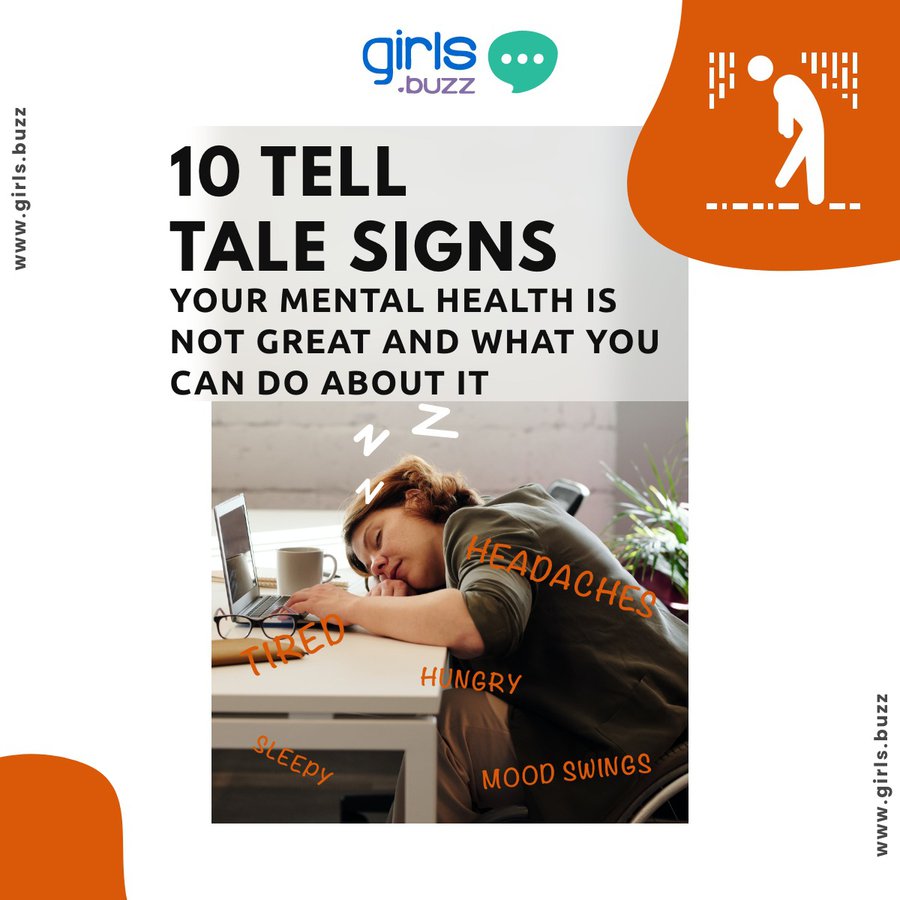10 tell tale signs your mental health is not great
7 minuteRead

Until a few years ago if you asked anyone what they thought of mental illnesses, they’d blatantly refer to it as dementia or schizophrenia. Thankfully, things have changed. Though these are debilitating mental health conditions, there are many others that aren’t as easily recognised.
Anxiety, stress and depression also encompass poor mental health. The need of the hour is for communities to reach out to individuals that are suffering from poor mental health. With acceptance comes the ability to seek help, cope and get on the road to recovery.
Depression and anxiety are something that can affect anybody. However, a lot of people don’t come out in the open with the apprehension that they will face social stigma.
Over the years, mental health issues are being discussed loud and clear. A lot of celebrities too have come out stating that at some point in their lives they suffered from poor mental health. Selena Gomez, Deepika Padukone, and Alia Bhatt are a few names on that list. Every year, 10th October is celebrated as World Mental Health Day. The day is observed to build awareness around mental health and advocate against social stigma.
10 Warning Signs that Indicate it’s Time to Care for your Mental Health
Major mental health illnesses are not something that appears “out of the blue”. They usually begin with small visible changes. If not addressed in time, they can even blow out of proportion. In this blog, we will be discussing the warning signs and everyday struggles that are indicative of poor mental health.

1. Indigestion
Bad eating habits can cause indigestion. However, recurring indigestion is usually associated with anxiety or being worried. It is a sign of poor mental health. Stress increases the amount of acid in the stomach which eventually leads to heartburn. Each time you get anxious or stressed, your brain sends signals to your gut and slows it down. This can further lead to stomach pain, bloating and cramps. A lot of people also experience Irritable Bowel Syndrome (IBS). If you are experiencing the need to repeatedly run to the toilet, there is some kind of anxiety that is knowingly or unknowingly affecting you.
2. Relying on Stimulants to the Extreme
As they say, everything is good in moderation. When you engage in the consumption of stimulants such as alcohol, caffeine or nicotine excessively or as a path of escapism from your present-life situation, it is alarming. Over-reliance on any kind of stimulus is a sure-shot sign of stress or depression. Those with poor mental health turn to caffeine to mask sleeplessness while alcohol and cigarettes are used as a remedy to erase painful memories. Substance abuse is usually a common symptom among most mental health patients.
3. Dramatic Change in Sleeping Patterns
Are you sleeping too much or too little? If yes, it could indicate depression or a sleeping disorder. Those with depression or anxiety often experience irregular sleeping patterns or constantly disturbed sleep. Tossing and turning before going to bed, repeatedly checking social media, or staying up late are signs that your mental health is affecting you every night.
4. Your Productivity at Work is Low
Your performance at work can indicate a potential mental health issue. If you suddenly feel overwhelmed with everyday tasks or develop a feeling that you are incapable, chances are your mental health is not great. For example, you’re disinterested during meetings, you lack concentration and enthusiasm in tasks that would previously excite you, you’re falling behind, missing deadlines or repeatedly not showing up for work. This can either be a job burnout or a sign that you’re extremely hassled about something.
5. Being too Critical of Oneself
Those with poor mental health often live with unexplained guilt. If you feel worthless, have low self-esteem, or keep blaming yourself for everything that goes wrong, it may be a sign of a mental illness. Thoughts like “I am a failure”, “it’s my fault always” or “I don’t want to live anymore” can be extremely alarming. Such feelings could even mean a person is suicidal and needs immediate help.
6. Feeling Unhappy or Sad
Experiencing emotions such as anger, sadness or unhappiness is okay in a normal situation. However, unreasonable dramatic emotional outbursts can be problematic and hint at depression or any other mental illness. If something you used to love earlier is no longer bringing you joy or you regularly feel remorse, your mental health needs attention.
7. Appetite Changes
Anxiety triggers psychological and emotional changes in your body to help you deal with pressure. While some people binge-eat when they’re stressed, the opposite happens with others. Anxiety, depression and stress can kill your appetite. During a time when the anxiety is extremely high, your body releases excessive amounts of cortisol which is a stress hormone. This further increases the acid production in your stomach thereby making you feel bloated and suppressing your hunger.
8. Withdrawing from Social Contact
Social withdrawal is a tell-tale sign of poor mental health. It is also a common symptom of clinical depression. If you have a strong urge to pull away from others and shut down completely from the outside world, it is a sign your mental health is deteriorating. It may even give you a feeling that you are a burden to this world. If Friday nights no longer excite you as they would previously or if hanging out with a friend is seeming more like a chore, you need to do something about it.
9. Muscle Aches & Body Pain
Another tell-tale sign of not-so-great mental health is fatigue, lethargy and muscle pain. After a workout or exercise routine, if your body is feeling sore, it’s normal. However, if you experience muscle aches, joint pain and body cramps for prolonged periods of time, it’s alarming. A lot of people experience knee pain during a stressful event.
10. Extreme Highs and Lows
As mentioned earlier, mood swings are quite normal in individuals with poor mental health. However, these moods are not stable. In some situations, they may seem like the happiest people ever whereas they may be incredibly miserable, sad and unhappy during other times. Clinically, it is also referred to as a manic depression. These phases of highs and lows are often referred to as episodes.
If any of the above unaddressed mental health symptoms last longer, it may be time to see a mental health counsellor.
Small but Significant Ways to Look after your Mental Health
In today’s fast-paced world, looking after your mental health is important. Even the slightest form of anxiety or stress can blow out of proportion if not tackled in time. It should be aided with therapy and medication if needed. From seeking help to surrounding yourself with the right people, the road to recovery begins when you make small but important changes to your everyday lifestyle. Here they are:

Watch & Read Positive Content
We all consume a lot of information on a daily basis, especially via social media platforms. Sometimes, it is important for your brain to switch off from the content that is meaningless. Instead, take a break to read a self-help book or watch an inspiring TED Talk.Rest as much as you can
Mental health and sleep are closely connected. A lot of people with poor mental health suffer from insomnia as well. In order to be fresh and keep your mind free from distractions, try to get at least six hours of sound sleep.Develop a Hobby
With a cluttered mind, you may not want to do anything. However, try and pick up a hobby to lighten the mood. It may be singing, dancing, painting, or even exercising. Hobbies are a great way to unleash the creativity that lies within you. It will further give you a sense of accomplishment and make you feel positive.Reach Out
If you’re feeling low, speak to a near and dear one. Never be afraid to voice your feelings. Venting out will make you feel much better. You can also seek mental health counselling.Get a Pet
A great way to reduce anxiety and stress is by getting yourself a pet. Dogs and cats offer great companionship. They can be a great source of comfort and motivation when you’re feeling low. Studies reveal that pet owners have a better quality of life.
While these are some lifestyle changes you can make to boost your mental health, there are other ways to go about it as well if your mental health is taking over a significant portion of your life. There are many organisations and NGOs that are working relentlessly to destigmatise mental illnesses in India.
5 Organisations in India that are Working towards Improving Mental Wellness
- Neptune Foundation, Mumbai: This Mumbai-based NGO is mainly involved in identifying homeless people with mental illnesses and helping them with essential commodities, treatment and shelter. During the COVID-19 pandemic, Neptune Foundation also launched helpline numbers for people to reach out in case they faced severe spells of stress or anxiety while staying indoors.
- The Banyan, Chennai: The Banyan is a Chennai-based organisation set up in 1993. Their main goal behind setting up the organisation is to approach mental health through the well-being and development angle rather than the framework of an illness. They cater to mentally ill and homeless women. They also provide free-of-charge mental health and social care services.
- Vishwas Counselling, Bangalore: Vishwas is a society for mental health in Bangalore that provides a safe and secure environment for individuals to share their profound thoughts and feelings. They help people become more aware of themselves and cope with their feelings better. The services they offer are completely free. They also offer confidential counselling for people with emotional stress.
- Manas Foundation, Delhi: Manas Foundation is an organisation that strives to create inclusive communities that are mentally healthy. They work in collaboration with communities, organisations and institutions. Besides mental wellness, they also promote gender equality and justice.
- Caring Minds, Kolkata: Caring Minds is a state-of-the-art centre for psychological growth in Kolkata. They promote mental wellness by conducting therapy workshops for kids, adolescents, adults and the elderly. They are backed by a team of professionals who provide expert services for all kinds of issues related to the mind.
Mental health awareness is important. If you or anyone you know is experiencing any of the mentioned symptoms, taking necessary action and precaution is important. Mental health is a sensitive subject, and thus has to be tackled with utmost sensitivity.
Express care, affection and love towards those who need it the most. It can go a long way in making them feel good and positive about themselves.
Write, Record and Answer! Consume Unlimited Content! All you need to do is sign in and its absolutely free!
Continue with one click!!By signing up, you agree to our Terms and Conditions and Privacy Policy.











